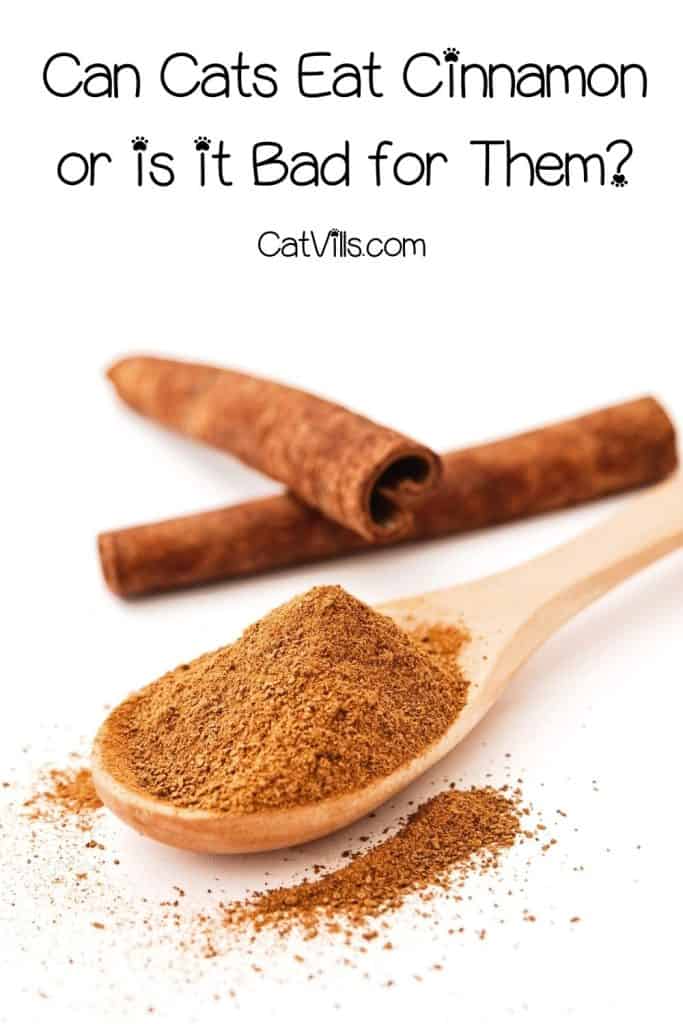Last Updated: 2 years ago
Cinnamon is a common spice used in human food, beverages, or even for decoration. But it’s also used as a repellent for cats.
Most cats don’t like cinnamon. And since their sense of smell is very sensitive, most of them hate the smell of cinnamon. However, you’ll find some cats being attracted to it out of curiosity.
Join us as we explore all you need to know about cinnamon for cats.
Can Cats Eat Cinnamon?
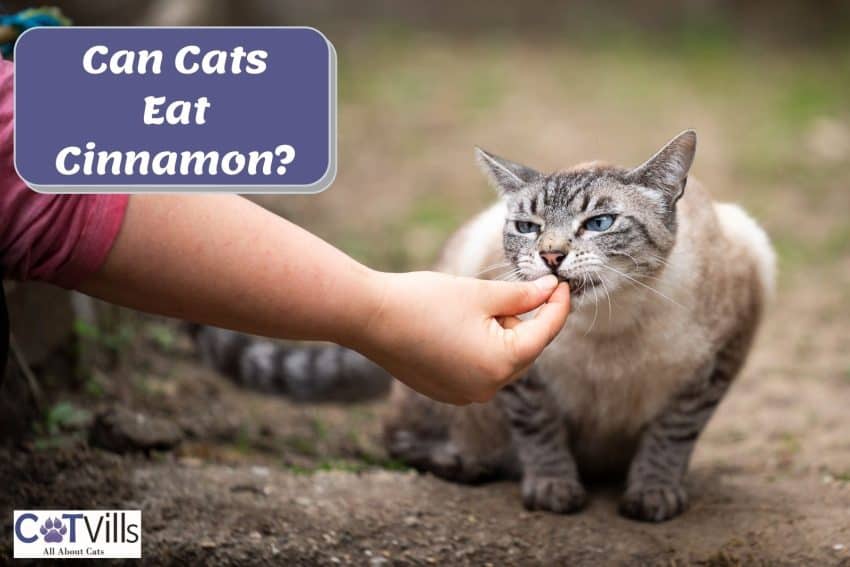
Yes, they can. According to ASPCA, cinnamon is not toxic to cats, dogs, or horses.
However, only in small amounts. Large amounts of this spice could lead to health issues. We’ll talk about those in a moment.
Just because something is not poisonous doesn’t mean it’s still not bad for your feline friend.
Is Cinnamon Bad for Cats?
So, will cinnamon hurt cats? In small amounts, no. However, as already mentioned, cinnamon can be toxic to cats when fed in excess or when they’re exposed to too much of it.
How so? Unlike humans, cats lack the enzymes responsible for breaking down a cinnamon compound known as coumarin, causing it to build up in the cat’s system.
In a worst-case scenario, it can cause a toxic reaction.
Cats shouldn’t eat cinnamon rolls as they contain raisins and other harmful ingredients. Any processed foods that contain cinnamon are a no-go for cats.
Cinnamon toast crunch may not contain toxic levels of cinnamon, but it has too much sugar and additives that are harmful to cats. It’s best to avoid it, and any other sugary foods, entirely.
Why Cats Should Not Eat Cinnamon?
Coumarin has a wide range of uses, from medicinal applications to rat poison. Coumarin kills rodents by inducing liver failure and hemorrhaging.
However, the type of cinnamon you’ll find in human food contains a lower concentration of coumarin.
While it may not always cause the same issues in cats, it’s still not safe to let it accumulate in their system.
We’ll discuss some of the potential symptoms of toxicity in a moment.
However, since the symptoms depend on the type of exposure, we first need to discuss how your cat ends up coming into contact with cinnamon in the first place.
How Cats Get Exposed to Cinnamon
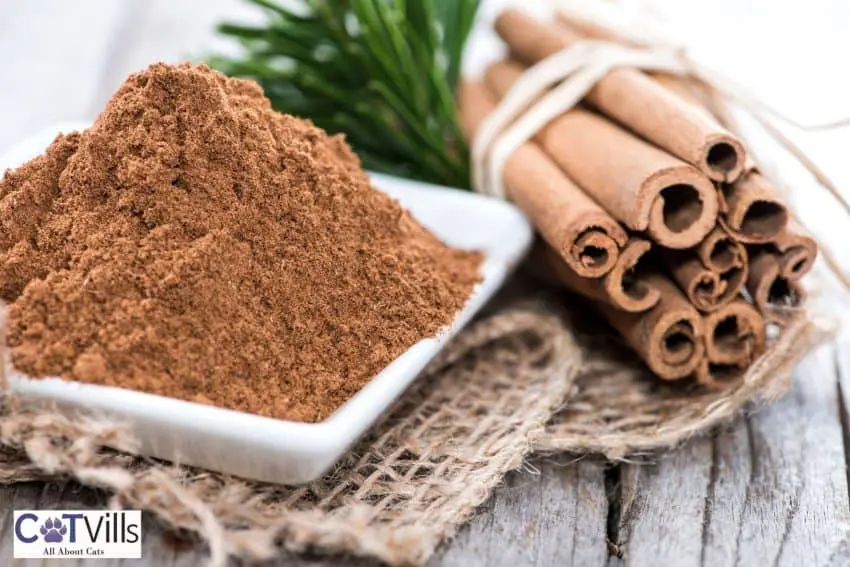
Below are some of the ways cats may come into contact with cinnamon.
Ingesting
The most common way cats get exposed to cinnamon is through ingesting it. In some cases, owners may actually intentionally feed cinnamon powder to their felines, thinking that they’re doing something beneficial.
For example, cinnamon is useful to treat diabetes in people since it lowers blood sugar and improves insulin resistance.
It has also been used to treat heart diseases and improve heart health by lowering blood pressure.
Some people may feed cinnamon to their diabetic cats, assuming it will have the same benefits for cats with Feline diabetes or cats dealing with obesity.
Cats can also accidentally end up ingesting the spice. Perhaps you’re using a cinnamon stick in a mug of hot cider or in your pumpkin pie recipe and your cat decides to give it a lick.
Or maybe you’re using a cinnamon tree to repel other critters from your garden.
Maybe your cat even licks ornaments that you made that contain cinnamon (for example, maybe you dipped pine cones in the delicious-smelling spice).
Inhaling
If you are using an air freshener or diffuser containing cinnamon additives or cinnamon essential oil, your cats may inhale it.
Unlike Cinnamon trees and powders, cinnamon essential oils are toxic to cats. So avoid using it in your diffusers.
Cats can also accidentally inhale small doses of cinnamon powder, especially if you’re baking with it.
Skin Exposure
This one is pretty straightforward. If you touch cinnamon oil or the cinnamon plant itself and touch your cat with the same hands, you will expose them to it.
Symptoms of Cinnamon Toxicity
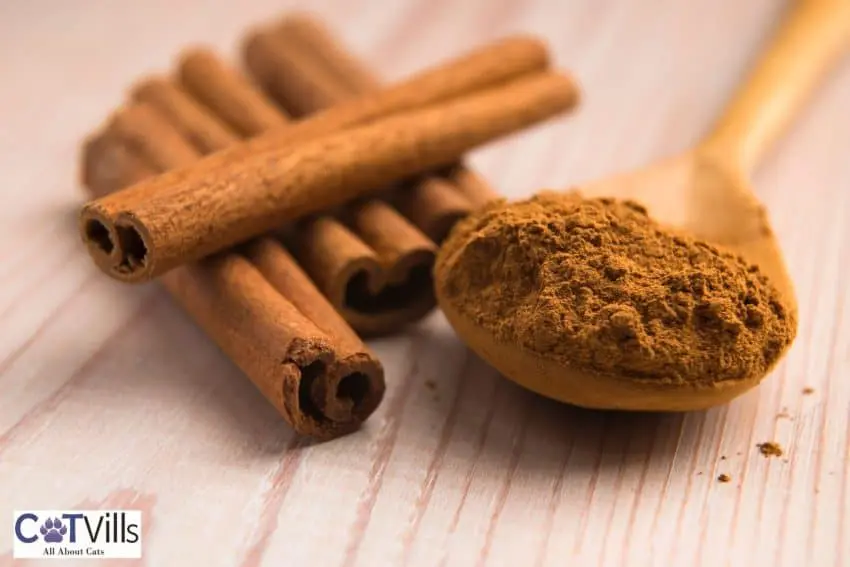
Cinnamon toxicity or allergic reactions to cinnamon don’t happen often. But when they do, the following symptoms are some ways to diagnose it based on the method of exposure.
Ingesting
- Diarrhea
- Low blood sugar
- Blood-thinning
- Abnormal heart rate
- Vomiting
- Liver Disease or Liver Toxicity
- Organ damage and failure
Inhaling
- Coughing
- Wheezing
- Difficulty breathing
- Sneezing
Skin Exposure
- Redness
- Itchiness
- Irritated skin
- Sores and rashes
- Burns
- Scratching
What To Do If Cats Eat Cinnamon?
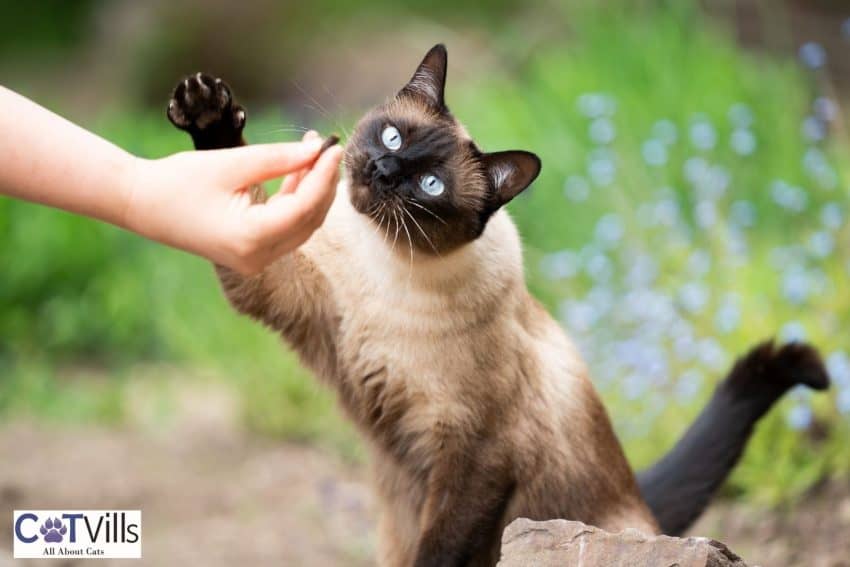
If your cat eats a small amount of cinnamon, nothing may happen. But if you notice any of the effects mentioned above, call your vet as soon as possible.
The biggest mistake you can make is to try and treat the cat yourself. Unless you’re a vet, a lot of things could go wrong.
For instance, some pet owners may feed their cats steroids to help deal with the symptoms, but they could make it worse.
Treatment of cinnamon toxicity depends on the mode of exposure and the symptoms your cat is experiencing.
It takes a qualified vet to rule out any other issues your cat could be suffering from. For instance, vomiting and diarrhea are also symptoms of eating cream.
And once they establish its cinnamon toxicity, they can begin treatment based on the reaction the cat is having. Allergic reactions will have a different treatment compared to respiratory issues.
Cinnamon Alternatives for Cats

If you’re looking for deterrents to keep your cats away and cinnamon is no longer an option, below are some alternatives;
- Rosemary
- Lavender
- Mustard seed
- Cayenne Pepper
- Banana smell
- Mint smell
- Pine cones
- Wet coffee grounds
- Ultrasonic pest repellants
- Motion detector sprays
- The smell of a dirty litter box
How To Safely Use Cinnamon as A Repellant for Cats
Cinnamon is an effective deterrent, but the health issues associated with it aren’t worth it. To safely use it and prevent your cats from ingesting it or coming into contact with it, you can mix it with other repellants.
For instance, you can mix powdered cinnamon, Rosemary, and Lavender and use it as a spray.
This way, even though the cat is attracted to the cinnamon, it will be deterred by either the Rosemary or the Lavender.
Will Cats Recover from Exposure to Cinnamon?
That depends on the damage caused to the critical body organs. If it’s an allergic reaction to cinnamon, chances of recovery are high.
But if it causes organ failure or adverse respiratory issues, your vet will advise you accordingly. Just make sure you seek veterinary care ASAP as soon as you note any signs of toxicity or allergic reactions.
Conclusion
There are many healthy foods you can feed your cat or repellants for your garden, but cinnamon is among foods that are bad for cats.
As we’ve established, excessive amounts of cinnamon are toxic, and it gets even worse if they inhale it or when it gets to their skin.
Be careful when handling cinnamon around your cats, and opt for alternative methods to deter cats.
References:
